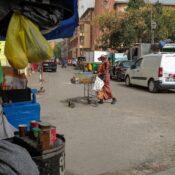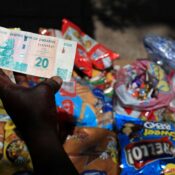
A lot of people are protesting in Georgia as the opposition questions the election findings
Georgia’s governing party won an election with reports of vote irregularities, which led Western countries to call for probes. On Monday, thousands of people protested outside of Tbilisi’s parliament.
They saw the parliamentary election as a very important choice for the country’s future, and some of them carried anti-Russia messages. When it comes to foreign policy, the Georgian Dream party has strengthened ties with Russia, while the opposition wants to speed up the country’s union with Europe.
Although Georgia has applied to join the EU, its candidate status was put on hold because of laws about foreign agents.
The word “stolen” was projected on the front of the southern Caucasus country’s Soviet-era parliament building in Tbilisi. Police watched, but there were no signs of a fight.
The 2012-elected Georgian Dream party got almost 54% of the vote on Saturday, according to the election committee.
The four biggest opposition groups that won seats in parliament said they didn’t agree with the results and would not be in the chamber.
Prior to the results being released, President Salome Zourabichvili had asked people to take to the streets.
“The election wasn’t lost.” “They tried to steal your future and your vote,” Zourabichvili told the crowd while flying the flags of both Georgia and the EU.
“Together, peacefully, as we are today, we will defend what is ours: your constitutional right to have your vote respected.”
European Organization for Security and Cooperation in Europe monitors said they saw cases of vote-buying, voter bullying, and poll stuffing that could have changed the results, but they didn’t say the election was rigged.
Twenty-eight-year-old Tbilisi resident Ana Korkia said she had protested to “show European leaders that we are here and this election result is not our choice.”
The election results make it harder for the European Union to incorporate more former Soviet states into its plans to grow.
The Western military group NATO and the European Union both wanted a full review into what they called the “uneven playing field” in the election.
The US was talking with its European partners about what kind of group should look into reports of violations, according to Matthew Miller, a spokesman for the State Department.
President Obama has put sanctions and visa bans on members of the ruling party and far-right activists in Georgia. If the government doesn’t listen to calls to “walk back its anti-democratic actions and return to its Euro-Atlantic path,” Miller said, Washington could take action.
“We do not rule out further consequences if the direction of the Georgian government does not change,” he said, but he did not say what those consequences might be.
Problems with “constitutional order”
The former Soviet republic that broke away from Moscow in 1991 has minimal formal powers, but Zourabichvili has called the outcome a “Russian special operation.”
Her belief was expressed to Reuters in an interview: “The method used and the support of most probably Russian FSB (Federal Security Service) types is shown in this election.”
In response, Russia denied meddling in the election. The main political organization that replaced the KGB in the Soviet era, the FSB, could not be reached for comment.
Dmitry Peskov, a spokesman for the Kremlin, said that the election result was “the choice of the Georgian people.” He also said that the West was trying to destabilize the situation.
Numerous polls showed that many Georgians disliked Russia because it backed two separate areas of Georgia. For a long time, Georgia was one of the most pro-Western countries to come out of the Soviet Union. In 2008, Russia beat Georgia in a short fight over the rebellious region of South Ossetia.
Local media claimed that Prime Minister Irakli Kobakhidze said the opposition was trying to “shake the constitutional order.” It was his government’s promise to stay committed to European unity.
Using official numbers, Georgian Dream got 54% of the vote, which is 1.12 million votes. This is 335,000 votes more than the four biggest opposition parties put together, which are very divided.
It won by huge margins—up to 90%—in some rural areas, but not so well in Tbilisi and other big towns.
Gadzina Ivanishvili, who started Georgian Dream and is generally seen as the most important person in the 3.7 million-person country, praised the people of Georgia for their choice. Voting was free and fair, according to the poll board.
All Categories
Tags
+13162306000
zoneyetu@yahoo.com


